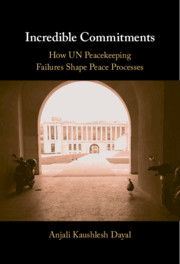Book contents
- Incredible Commitments
- Incredible Commitments
- Copyright page
- Contents
- Tables
- Acknowledgments
- 1 Introduction
- 2 The Social Context of International Peacekeeping and the Alternative Benefits of Bargaining
- 3 Methods and Case Selection
- 4 The Arusha Negotiations, 1990–1994
- 5 Guatemala, 1989–1996
- 6 Conclusion
- Bibliography
- Index
6 - Conclusion
Published online by Cambridge University Press: 02 October 2021
- Incredible Commitments
- Incredible Commitments
- Copyright page
- Contents
- Tables
- Acknowledgments
- 1 Introduction
- 2 The Social Context of International Peacekeeping and the Alternative Benefits of Bargaining
- 3 Methods and Case Selection
- 4 The Arusha Negotiations, 1990–1994
- 5 Guatemala, 1989–1996
- 6 Conclusion
- Bibliography
- Index
Summary
The conclusion examines my argument’s implications for both scholarship and policy. For scholars, the evidence I offer here challenges the strict geographic and chronological separation between time periods and peacekeeping missions that some studies take as given. For policymakers, the arguments and evidence I advance contribute to ongoing debates about the future of peace operations.Peacekeeping today is turning increasingly towards a more military posture—but key among my argument’s implications is the idea that if the reconstruction, investment, and refugee resettlement services the international community can provide are more important than security protection to some combatants, then tying negotiation, peacekeeping, and intervention more tightly to the UN’s aid and humanitarian agencies may represent another, better direction for the UN.
Keywords
- Type
- Chapter
- Information
- Incredible CommitmentsHow UN Peacekeeping Failures Shape Peace Processes, pp. 164 - 181Publisher: Cambridge University PressPrint publication year: 2021

